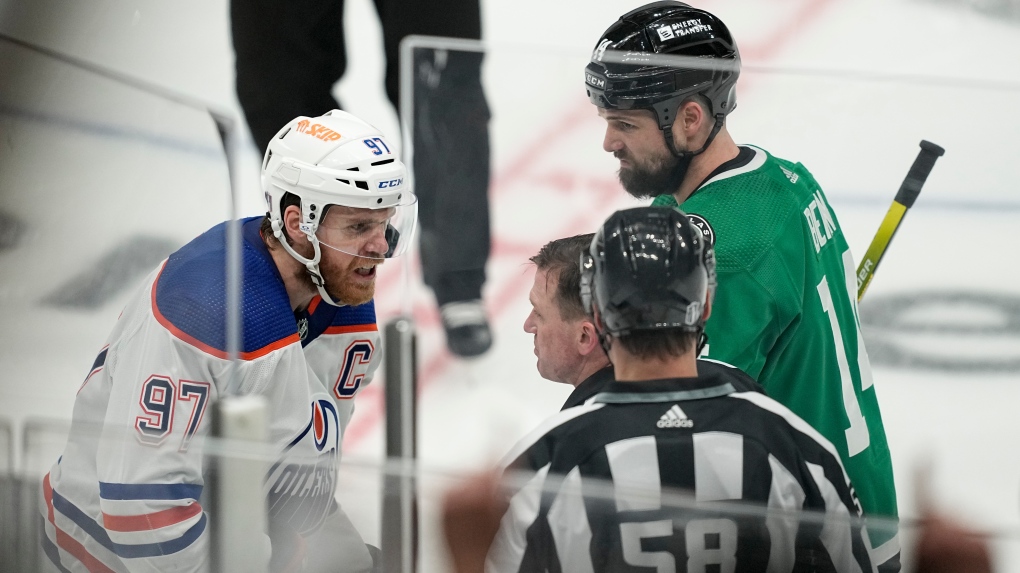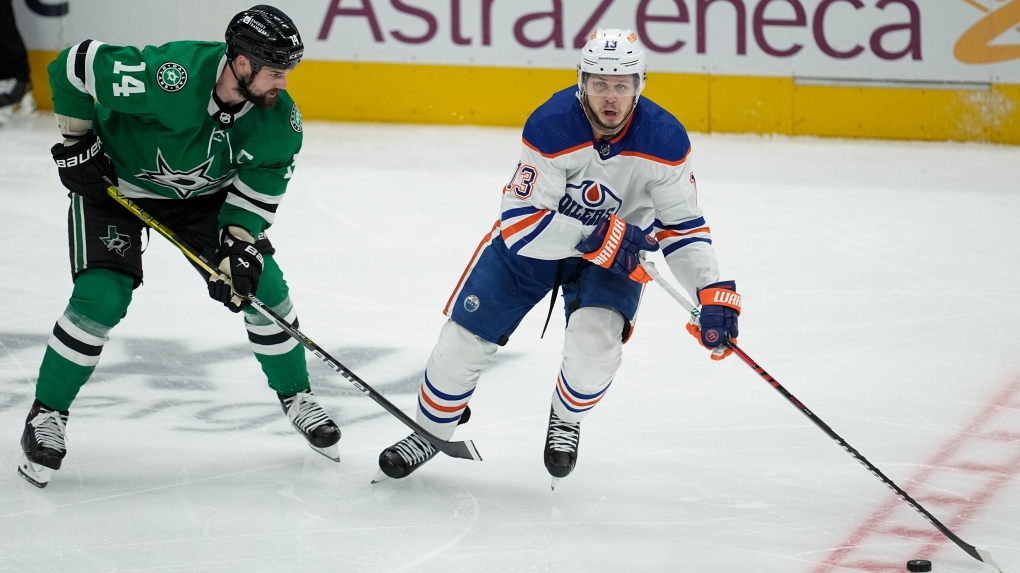Killing penalties an Oilers 'X' factor this post-season
It was the longest four-minute penalty of Connor McDavid's life.
"Long. Really long. Really, really long," the Edmonton Oilers captain said following his team's game over the Dallas Stars on Thursday.
Long because McDavid had to watch while the Stars kept the play in the Oilers' end for long stretches and peppered Oilers goalie Stuart Skinner with 11 shot attempts, four of which Skinner saved and two that went off posts.
"I hated every second of it," he said.
The Stars didn't score during the sequence, however — a wasted opportunity after the blade of McDavid's stick clipped Dallas centre Matt Duchene in the mouth, drawing blood, resulting in the Oilers' star's trip to the penalty box and a glorious early overtime chance for Dallas to win the game with the man advantage.
It didn't happen.
The Oilers' penalty-killers stuck to the script they've been performing to near-perfection in this year's National Hockey League post-season by holding the Stars' power-play attack along the perimeter and not allowing it many good chances to help Edmonton win the first game of the Western Conference Final 3-2.
Why, in their previous game, Edmonton's special-teams unit did much the same thing to the Vancouver Canucks' power play in what many point to as the turning point in Game 7 of the Oilers' second-round victory.
 Edmonton Oilers star Connor McDavid reacts to a penalty called on him in overtime as Dallas Stars captain Jamie Benn looks on as after a ruling against him by the officials during Game 1 of the NHL Western Conference Final on May 23, 2024, in Dallas. (Tony Gutierrez/Associated Press)
Edmonton Oilers star Connor McDavid reacts to a penalty called on him in overtime as Dallas Stars captain Jamie Benn looks on as after a ruling against him by the officials during Game 1 of the NHL Western Conference Final on May 23, 2024, in Dallas. (Tony Gutierrez/Associated Press)
NHL's best playoff PK
The unit is tops among NHL playoff teams with a 91.4-per-cent success rate, allowing opposing power plays just three goals — all by the Vancouver Canucks in a two-game span last series — in 35 attempts.
Head coach Kris Knoblauch said after Thursday's 3-2 Oilers win over the Stars in double overtime that competence, confidence and chemistry among the players tasked with shorthanded duty are the major factors that saw them deny Dallas a power play goal over five attempts.
"When things are going well, and you have the confidence, it just rolls," Knoiblauch told reporters Thursday night.
"Things go well. Thinking back to the regular season, right after the all-star break, we had that break and the penalty kill wasn't good. We were just a step behind. Right now, there's a lot of confidence and everyone knows how important it is.
"They're doing a heck of a job."
Mattias Janmark, one of six forwards in the Oilers' penalty-killing rotation, said before Game 1 their "pressured" approach is more aggressive than what's used by most NHL teams.
"We don't want to give them time, (and) try to get them out of their set-up," said Janmark, who was a member of the Stars when they made it to the Stanley Cup final in 2020.
"Having good sticks all over the ice, pressuring, getting pressure on their entries, getting loose pucks and then clearing the puck and winning those stick battles. That's the main thing, I think."
 Edmonton Oilers forward Mattias Janmark skates with the puck as Dallas Stars captain Jamie Benn tracks him during overtime in Game 1 of the NHL Western Conference Final on May 23, 2024, in Dallas. (Tony Gutierrez/Associated Press)
Edmonton Oilers forward Mattias Janmark skates with the puck as Dallas Stars captain Jamie Benn tracks him during overtime in Game 1 of the NHL Western Conference Final on May 23, 2024, in Dallas. (Tony Gutierrez/Associated Press)
Aggression, skill 'dangerous' mix
Top-line forward Ryan Nugent-Hopkins also patrols the ice for the Oilers while they're shorthanded, a factor that Stars head coach Pete DeBoer said prior to Game 1 is effective.
"An aggressive penalty-kill mentality, combine that with really good players, it's dangerous," said DeBoer, who admits the Stars also use skill players while shorthanded, including Wyatt Johnston and Roope Hintz, and noting Dallas saw the tactic against Vegas (Jack Eichel) and Colorado (Nathan MacKinnon) this post-season.
Oilers' penalty-killer Derek Ryan said Friday during a media availability in Dallas that special teams are "huge" in the playoffs and that players take pride in doing the job well.
"Our work ethic has gone up, our structure and details have gone up, and it has to this time of year," said Ryan, adding that continuity of linemates "is definitely huge because there's a chemistry to it."
More commitment to defensive play has helped the Oilers' cause as well, as evidenced by the increased back-checking and shot-blocking.
Ryan said the playoffs are much more than just scoring goals.
"It makes me happy to be in this position where we're winning games the way we are because that's the only way you can win this time of year," he said.
"It's just nice to have a full group that can contribute in different ways. Obviously, our (scorers) do their thing and they're the best in the world, but there are a lot of guys that contribute in other ways that don't necessarily get noticed."
A confident goalie gives the rest of the team confidence, too.
Knoblauch said after the game when the Oilers did suffer breakdowns, "Stu made some saves."
"(The Stars) adjusted their power play, they had some different looks," he said.
"We'll have to be prepared for seeing that next game and possibly some other things. They've got good players, they've got good, skilled guys who are going to get their opportunities."
CTVNews.ca Top Stories

Bird flu, measles top 2025 concerns for Canada's chief public health officer
As we enter 2025, Dr. Theresa Tam has her eye on H5N1 bird flu, an emerging virus that had its first human case in Canada this year.
Ottawa police identify victim of Christmas Day homicide in Hintonburg, charge suspect
The Ottawa Police Service says the victim who has been killed on Christmas Day in Hintonburg has been identified.
Christmas shooting at Phoenix airport leaves 3 people wounded
Police are investigating a Christmas shooting at Sky Harbor Airport in Phoenix that left three people injured by gunfire.
Your kid is spending too much time on their phone. Here's what to do about it
Wondering what your teen is up to when you're not around? They are likely on YouTube, TikTok, Instagram or Snapchat, according to a new report.
Plush toys recalled due to choking hazard
Health Canada announced a recall on a series of plush toys due to a choking hazard. Anyone who has purchased an elephant, giraffe, lion, tiger and/or panda plush toy with an attached baby can return them to the place of purchase for a refund.
6,000 inmates stage Christmas Day escape from high-security Mozambique prison
At least 6,000 inmates escaped from a high-security prison in Mozambique's capital on Christmas Day after a rebellion, the country's police chief said, as widespread post-election riots and violence continue to engulf the country.
Azerbaijan observes day of mourning for air crash victims as speculation mount about its cause
Azerbaijan on Thursday observed a nationwide day of mourning for the victims of the plane crash that killed 38 people and left all 29 survivors injured as speculation mounted about a possible cause of the disaster, with some experts saying that the airliner was damaged by Russian air defence fire.
Donald Trump says he urged Wayne Gretzky to run for prime minister in Christmas visit
U.S. president-elect Donald Trump says he told Canadian hockey legend Wayne Gretzky he should run for prime minister during a Christmas visit but adds that the athlete declined interest in politics.
Prayers and tears mark 20 years since the Indian Ocean tsunami that killed some 230,000 people
People gathered in prayer and visited mass graves in Indonesia’s Aceh province on Thursday to mark 20 years since the massive Indian Ocean tsunami hit the region in one of modern history’s worst natural disasters.




























